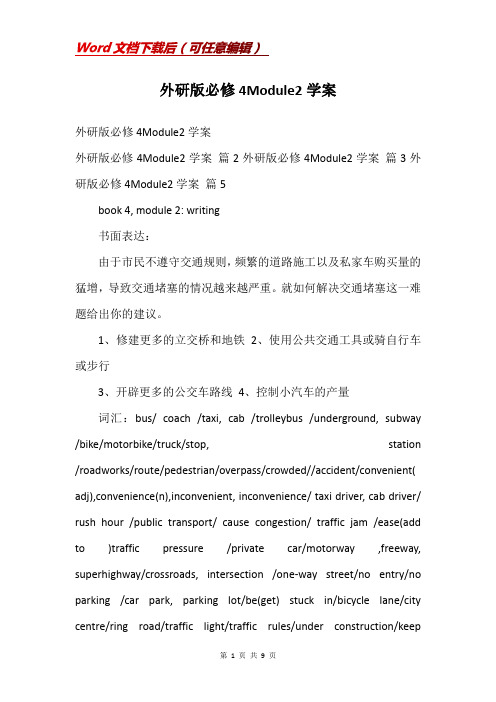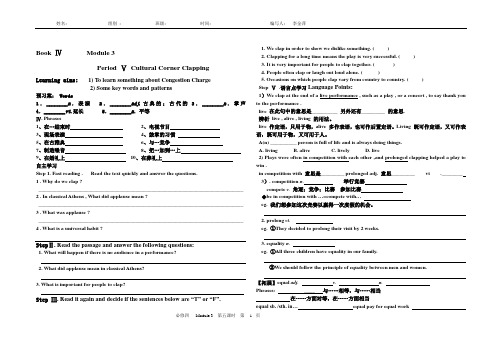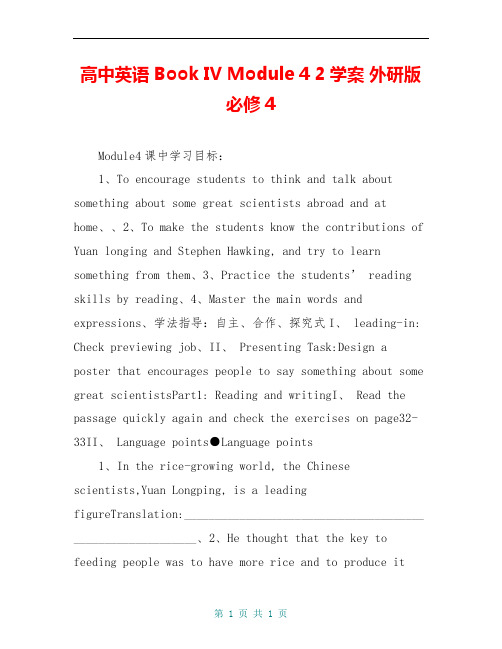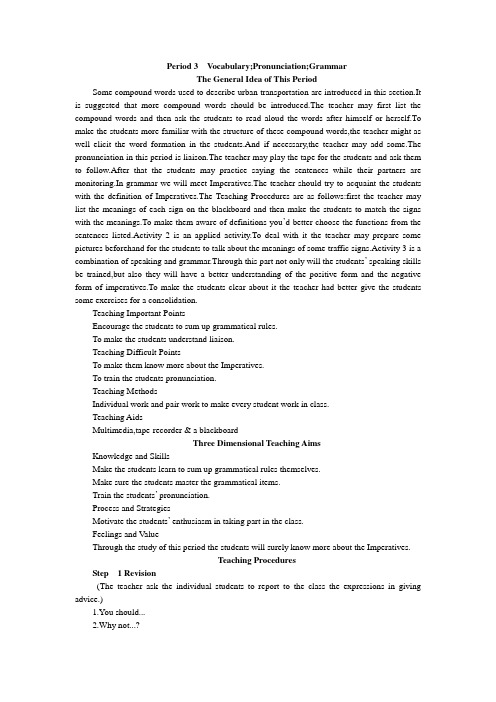高中英语外研版必修4学案学案2Module3 整单元 外研版必修4
外研版必修4Module2学案

外研版必修4Module2学案外研版必修4Module2学案外研版必修4Module2学案篇2外研版必修4Module2学案篇3外研版必修4Module2学案篇5book 4, module 2: writing书面表达:由于市民不遵守交通规则,频繁的道路施工以及私家车购买量的猛增,导致交通堵塞的情况越来越严重。
就如何解决交通堵塞这一难题给出你的建议。
1、修建更多的立交桥和地铁2、使用公共交通工具或骑自行车或步行3、开辟更多的公交车路线4、控制小汽车的产量词汇:bus/ coach /taxi, cab /trolleybus /underground, subway /bike/motorbike/truck/stop, station /roadworks/route/pedestrian/overpass/crowded//accident/convenient( adj),convenience(n),inconvenient, inconvenience/ taxi driver, cab driver/ rush hour /public transport/ cause congestion/ traffic jam /ease(add to )traffic pressure /private car/motorway ,freeway, superhighway/crossroads, intersection /one-way street/no entry/no parking /car park, parking lot/be(get) stuck in/bicycle lane/city centre/ring road/traffic light/traffic rules/under construction/keepcool/…句型:1. what’s the problem with… ?2. what’s the solution to the problem?3. it’s time for sb to do sth./it’s high time that sb did sth.4. we should take measures/steps/action to do sth./measures should be taken to…5.the reason why… is that…6. it’s a good idea to…7.how about/what about…? 8.why not/why don’t we… ? 9.let’s do …10.we’d better (not) do…补充:第一:first/firstly/at first/first of all/in the first place/to begin with/to start with/for one thing…第二: second/secondly/in the second place/next/then/for another thing…第三: third/thirdly/besides/in addition/furthermore/moreover/what’s more…最后/总之: finally/at last/lastly/in the last place/last of all/last but not least/in a word/in a nutshell…参考范文the traffic jams have become a terrible problem and they are usually caused by people _______________________________________________________ (不遵守交通规则)and_____________(道路施工)on the streets. besides, the increase of new cars also_______________________________________(导致)the traffic jams . therefore, __________________________________________(交通堵塞越来越严重). this causes people’s inconvenience and it’s high time _________________________________(采取措施解决这一问题). what’s the solution to the problem? my suggestions are as follows: ____________(第一), we should build more__________(立交桥) and underground lines so as to ______________________(缓解交通压力). _______________(第二),we’d better go to work or go shopping by bus ,by bike or on foot instead of driving private cars. __________(第三), ______________________(好点子) to open up more public bus routes. __________(最后), the production of cars should ____________(控制), for there are too many cars moving on the roads every day.________(总之), i believe we can improve our traffic conditions if we try our best.book 4 module 2 p12getting around in beijingread the passage and answer:1.________________________________________________________(招手,立刻就有出租车)time:2.they are usually red, and they _________the price per kilometeron the window.3.you should check the cab has a business _________(permit/permission), and ______________you ask for a ___________(发票,收据).4.public transport ___________(offer/provide/supply)a cheap way to _____________in beijing.5.there are 20,000 buses and _____________(电车)in beijing, but they __________(must/should/can) get very ___________.6.____________________________________to avoid public transport during the rush hour.7.________(车费)are cheap, _____________(to start/starting/started) at 1 yuan.8.buses numbered 1 to 100 ________________(limit)travel within the city centre. higher numbers have destinations _______________________(郊区).9.tourists shouldn’t miss the 103bus _______ offers one of the most ____________(impress/impressive/impression) routs, _________ the forbidden city and the white pagoda in beihai park.10.you’ll ______________________(看见) the rapidly changing city.11.however, there is also a night bus service, provided by buses with a number in the 200s.12.there _____(is/are) four _____________ lines in beijing, andseveral lines are _________________________. trains are fast and ________________(方便的), but rush hours _______ be terrible.13.tourists like these human-pedalled “tricycle taxis”, but they ________ be expensive.14.you should talk to the driver ,and make sure you know the price before you begin the journey, for example, if it is per person, single, or return.(分析本句)15.tricycles are worth_____________(use/to use/using/being used/to be used), if you want to __________ (explore/exploration) the narrow alleys(hutong)of old beijing.book 4 module 2 p14speaker 1on my way home a few days ago, i _______ _________ again in the traffic. while i was waiting, i saw a group of taxi drivers in front of me getting out of their cars. they seemed to know each other. they had coffee cups and one of them carried a thermos flask and ________ _______ some hot water to make tea. it was quite funny! but even after the tea party was over, the traffic was still _________ and we still couldn’t move.speaker 2a few days ago i had to catch a plane to sichuan province. the plane took off at 5:30 pm so i set off at ______ pm to allow plenty of time toget to the airport. but it wasn’t enough time. at 5 pm i was still only at the third _______ ________. it was just ridiculous! there was____ ____ i was going to catch the plane, so i told the taxi driver to turn back and go home.speaker 3it’s only 7 kilometers from my home to my place of work. but every day, it is almost certain there will be a traffic ______ as i get near the west fourth ring road. it’s so annoying! it takes at least 15 to 20 minutes to _______ ___________ it. i think the traffic jams are usually caused by people disobeying traffic rules. to get to the front of the line, they often take the bicycle _______. it’s the same with pedestrians and cyclists. they don’t wait for the green light to pass.speaker 4beijing traffic seems to have got noticeably worse recently. the causes seem to be __________ as the city prepares for the olympics, and a huge increase in new car owners and new drivers. whatever the cause, it’s enough to __________ you mad! why not limit the number of cars, build more _______________ lines or follow shanghai and build roads in the sky? these days i only go out in my car at night after 9 pm. that way i avoid the worst of the traffic.speaker 5going to the summer palace the other evening there was a bigtraffic jam at a narrow bridge. one lane in either direction. so obviously there were lots of cars _____________ on the wrong side of the road which then came to a complete stop when a car came ____ the other direction. result :no one was able to move for 10 minutes! as soon as it _____________ the same thing happened again. it’s unbelievable!book 4 module 2 p77conversation 1a: hello.nora: hi. it’s me , nora.a: hello. have you got your ticket?n: yes. i am coming on the ____th of june. the plane arrives at 5 pm. then i have a __________ at 6:15.a: that’s _________ hour. the roads will be very busy.n: how can i get to the central bus station?a: take the number 23bus at the airport. it will be just as quick as a taxi.n: thanks. i’ll let you know how i _________ ________.conversation 2a: hello.n: hi. it’s me. nora. there’s no way i’ll get to the bus ____________ in time for my coach. i’m on the 23 bus and it’s stuck in a traffic jam. it’s just ridiculous!a: oh dear. where are you exactly?n: on the ring road, not far from the hospital.a: keep _________! i’ve got an idea. why not take the underground? there’s a station near the hospital. it’ ll be _____________ but much quicker than the bus.n: good idea. i’ll phone you later.conversation 3a: hello.n: hi. it’s me again.a: hi, nora. where are you now?n: i’m at the bus station but i’ve __________ the coach. it’s so annoying! i only missed it by 2 minutes.a: listen! the coach stops at the railway station. take a taxi there now and you may catch the coach.n: ok. it’s worth ____________. i’ll speak to you later.conversation 4a: hello.n: it’s me again.a: where are you this time?n: on the coach! i finally ___________ ________ .a: it’s unbelievable!n: how do i get to your apartment from the coach station?a: ________ in the bus station ________ i’ll come and get you. what time do you arrive?n: at 8 o’ clock.a: see you then.n: thanks.。
外研版高一英语必修4学案Module4全单元学案2含有讲解

外研版⾼⼀英语必修4学案Module4全单元学案2含有讲解⾼⼀英语必修4学案Module 4 Grammar主备⼈: 周次18 时间_____编号:NO. 89 姓名:_____审核⼈:_________Learning Contents(学习内容): GrammarLearning Aims(学习⽬标):1. Make students learn how to use passive voice in different tenses.2.. To improve students’ oral practice of famous scientistsImportant and Difficult Points (重点难点):1. Use passive voice in different tenses.2. Remember the examples and the rules.【导读】被动语态1)被动语态的构成:被动语态是由“助动词be +done ”构成,⽽时态是通过助动词be, have, shall, will, should, would 的不同形式表现出来。
get doneget 是连系动词, 相当于be, 但get done 着重强调结果,并且get done句式不⽤by 来表⽰动作执⾏者,⽽be done 既可⽤by 表⽰出动作的执⾏者,也可以省略掉。
e.g. Our house is getting painted. We get paid by the day.含有情态动词的被动句式: 情态动词+be 或have been donee.g. The work must be done right now.be going to, be to, have to, used to等句式中的不定式后仍可以使⽤被动句式, 其中包括不定式完成式的被动句式. The task seems to have been finished.【导思】2)主语+谓语+宾语 e.g. He wrote this book. →The book was written by him.主语+谓语+双宾语(直接宾语与间接宾语)主语+谓语+宾语+宾语补⾜语e.g. They are going to paint the wall white.→__________________________________.The shop owner made him work over eight hours a day.He persuaded his father to give up smoking.____________________________________主语+谓语+it+宾补(形容词/名词)+to do/doing/that从句e.g. We consider it a waste of time to do so. →It is considered a waste of time to do so.3)vi. + prep. / vt.+n.+prep. / vi.+adv.+prep.这类短语变成被动语态时,介词不可省e.g. The house was broken into.Women were looked down upon in the old days.4)英语中主动形式表被动含义的⼏种情况当主语表⽰其本⾝具有某种特质或与众不同的特点,主语通常情况下是物⽽不是⼈。
2018届外研版必修4Module 3单元学案 (11页)

2018届外研版必修4Module 3单元学案重点识记单词1.bow vi.鞠躬2.bend vt.弯下腰3.hug vt.拥抱;紧抱4.aggressive adj.攻击的;挑斗的;挑衅的5.gesture n.姿势;姿态6.involve vt.包括;牵扯;卷入;与……有关7.slightly adv.轻微地;稍微8.youth n.年轻人9.spread vi.张开;蔓延;扩散;传播10.stare vi.凝视;盯着看11.wipe vt.擦;揩;抹12.panic v.& n.恐慌;惊慌13.request n.请求;要求14.favour n.恩惠;善意的行为15.live adj.现场的;活着的;有生气的16.slap vt.掌击17.religion n.宗教→religious adj.宗教的18.rude adj.粗鲁的;无礼的→rudeness n.粗鲁;无礼19.invitation n.邀请;请柬→invite vt.邀请20.classical adj.古典的;古代的→classic adj.经典的21.judgement n.判断;意见→judge v.判断;n.裁判;法官22.social adj.社会的→society n.社会23.equality n.平等→equal adj.平等的;vt.等于;比得上24.infectious adj.有感染性的→infect v.传染;感染→infection n.传染;感染municate vi.(用语言、信号)传递信息;交流→communication n.交流;沟通26.unconscious adj.无意的;不知不觉的→conscious adj.(反义词)有意的;有意识的;自觉的27.vary vi.变化→various adj.各种各样的→variety n.种类28.formal adj.正式的→formally adv.正式地→informal adj.(反义词)非正式的29.traditionally adv.传统地→traditional adj.传统的→tradition n.传统30.threatening adj.恐吓的;具有威胁的→threaten v.威胁→threat n.威胁31.deal n.协议;交易;vi.处理;应付;对待(过去式、过去分词dealt)32.performance n.表演→perform v.表演;运行;表现→performer n.表演者重点识记短语1.on guard(保持)警惕2.make a deal达成协议;做成交易3.lift up举起4.give away暴露(自己的情况)5.by accident偶然地6.up and down一上一下地7.say hello to向……问好8.switch on打开(灯、无线电等)9.hold up举起;延迟;阻碍必背经典句式1.When in Rome,Do as the Romans Do入乡随俗2.In France you should shake hands every time you say hello and goodbye.在法国,每当你打招呼或告别时都应该(和别人)握手。
外研版必修4Module2学案

外研版必修4Module2学案一、Module2 整体概述外研版必修 4 的 Module2 主要围绕“交通”这一主题展开,涉及了各种交通方式、交通问题以及未来交通的发展等方面的内容。
通过本模块的学习,学生能够了解不同交通方式的特点和优缺点,探讨交通拥堵等现实问题,并对未来交通的创新和变革进行思考。
二、重点词汇与短语1、“be connected with”:与……有联系;与……有关例如:His job is connected with the environment (他的工作与环境有关。
)2、“be/get stuck in”:被困在……例句:I was stuck in traffic for an hour (我被困在交通堵塞中一个小时。
)3、“in no time”:马上;立即比如:He finished his homework in no time (他很快就完成了作业。
)4、“get around”:四处走动;(消息等)传开“People can get around easily by bike in this small town”(在这个小镇上人们骑自行车可以很容易地四处走动。
)三、重点语法1、将来进行时将来进行时表示将来某一时刻或某一段时间正在进行的动作。
其构成是“will be +现在分词”。
例如:This time next week I will be lying on the beach (下周这个时候我将躺在海滩上。
)2、过去分词作定语过去分词作定语时,通常置于被修饰的名词之前或之后,表示被动和完成的意义。
如:The damaged car was sent to the garage (那辆损坏的汽车被送到了修理厂。
)四、课文解读1、“Traffic Jam”这篇课文介绍了城市交通拥堵的现状和原因,如车辆数量的增加、道路规划不合理等。
同时,也提到了一些解决交通拥堵的措施,如发展公共交通、限制私家车出行等。
外研高二英语必修四m3学案

Book ⅣModule 3Period ⅤCultural Corner ClappingLearning aims: 1) To learn something about Congestion Charge2) Some key words and patterns预习案: Words1.________n.表演2.________adj.古典的;古代的3.________n.掌声4.________vt.延长 5.________n.平等Ⅳ. Phrases1、在…结束时2、电视节目3、现场表演4、鼓掌的习惯5、在古雅典6、与…竞争7、制造噪音8、把…加到…上9、在婚礼上10、在葬礼上自主学习Step 1. Fast reading . Read the text quickly and answer the questions.1 . Why do we clap ?______________________________________________________________________________ 2 . In classical Athens , What did applause mean ?______________________________________________________________________________ 3 . What was applause ?______________________________________________________________________________ 4 . What is a universal habit ?StepⅡ. Read the passage and answer the following questions:1. What will happen if there is no audience in a performance?2. What did applause mean in classical Athens?3. What is important for people to clap?Step Ⅲ. Read it again and decide if the sentences below are “T” or “F”.1. We clap in order to show we dislike something. ( )2. Clapping for a long time means the play is very successful. ( )3. It is very important for people to clap together. ( )4. People often clap or laugh out loud alone. ( )5. Occasions on which people clap vary from country to country. ( )StepⅤ.语言点学习Language Points:1)We clap at the end of a live performance , such as a play , or a concert , to say thank you to the performance .live 在此句中的意思是__________ 另外还有_________ 的意思.辨析live , alive , living 的用法。
高中英语 Book IV Module 4 2学案 外研版必修4

高中英语 Book IV Module 4 2学案外研版必修4Module4课中学习目标:1、To encourage students to think and talk about something about some great scientists abroad and at home、、2、To make the students know the contributions of Yuan longing and Stephen Hawking, and try to learn something from them、3、Practice the students’ reading skills by reading、4、Master the main words and expressions、学法指导:自主、合作、探究式I、 leading-in: Check previewing job、II、 Presenting Task:Design a poster that encourages people to say something about some great scientistsPart1: Reading and writingI、 Read the passage quickly again and check the exercises on page32-33II、Language points●Language points1、In the rice-growing world, the Chinesescientists,Yuan Longping, is a leadingfigureTranslation:_______________________________________ ____________________、2、He thought that the key to feeding people was to have more rice and to produce itmore quickly、Translate:_______________________________________________ _____________、总结:介词to+n/v-ing 问题的答案_______________门的钥匙______________解决问题的关键________________大楼的入口_____________________3、 First Yuan Longping experimented with different types of rice、Translate:_______________________________________________ _____________观察with 的意思:My hands were blue with cold、___________________He writes with a pen、____________________________You must handle this parcel with care、_______________________experiment on / with sth表示“对……进行实验”。
高一英语外研版必修4教案:Module2 Period3 含解析 精

Period 3Vocabulary;Pronunciation;GrammarThe General Idea of This PeriodSome compound words used to describe urban transportation are introduced in this section.It is suggested that more compound words should be introduced.The teacher may first list the compound words and then ask the students to read aloud the words after himself or herself.To make the students more familiar with the structure of these compound words,the teacher might as well elicit the word formation in the students.And if necessary,the teacher may add some.The pronunciation in this period is liaison.The teacher may play the tape for the students and ask them to follow.After that the students may practice saying the sentences while their partners are monitoring.In grammar we will meet Imperatives.The teacher should try to acquaint the students with the definition of Imperatives.The Teaching Procedures are as follows:first the teacher may list the meanings of each sign on the blackboard and then make the students to match the signs with the meanings.To make them aware of definitions you’d better choose the functions from the sentences listed.Activity 2 is an applied activity.To deal with it the teacher may prepare some pictures beforehand for the students to talk about the meanings of some traffic signs.Activity 3 is a combination of speaking and grammar.Through this part not only will the students’ speaking skills be trained,but also they will have a better understanding of the positive form and the negative form of imperatives.To make the students clear about it the teacher had better give the students some exercises for a consolidation.Teaching Important PointsEncourage the students to sum up grammatical rules.To make the students understand liaison.Teaching Difficult PointsTo make them know more about the Imperatives.To train the students pronunciation.Teaching MethodsIndividual work and pair work to make every student work in class.Teaching AidsMultimedia,tape-recorder & a blackboardThree Dimensional Teaching AimsKnowledge and SkillsMake the students learn to sum up grammatical rules themselves.Make sure the students master the grammatical items.Train the students’ pronunciation.Process and StrategiesMotivate the students’ enthusiasm in taking part in the class.Feelings and ValueThrough the study of this period the students will surely know more about the Imperatives.Teaching ProceduresStep 1 Revision(The teacher ask the individual students to report to the class the expressions in giving advice.)1.You should...2.Why not...?3.You’d better...4.It’s a good idea to...5.Make sure...Step 2 VocabularyT:Good job!Next step we will learn some compound nouns.Now look at the blackboard.What are they called?(Write the following two words on the blackboard.)traffic jam road workSs:They are compound nouns.T:You’re quite right.Now match the words from Box A with those from Box B to make compound nouns.(Show the following on the screen.)A bicycle city ring rush trafficB centre hour lane lights roadSuggested answers:1.bicycle lane2.city centre3.ring road4.rush hour5.traffic lightsT:More exercises are as follows:(Show the following sentences on the screen.)Match the words and definitionsExample:Lots of traffic which isn’t moving. traffic jam1.a road which goes around the city __________2.a read one means “stop”;a green one means “go”__________3.the busiest time of the day __________4.a part of the road reserved for bicycles __________5.work in progress on the road __________6.the centre of the city __________(Give the students a few minutes and then call back their answers.)Suggested answers:1.ring road2.traffic lights3.rush hour4.bicycle lane5.road works6.city centreStep 3 PronunciationT:So much for the vocabulary.Now let’s come to the next part—pronunciation.(The teacher play the tape for the students.)Now listen to the underlined sounds in the following sentences.(Show the following sentence on the screen.)1.I got stuck again in the traffic.2.They seemed to know each other.3. ...and we still couldn’t move.4.It was just ridiculous.5.They don’t wait for the green light to pass.T:You must remember:Good pronunciation needs a lot of training,imitation and practice.Listening is as important as imitation.You should not only listen to the teacher’s and your classmates’ pronunciation,but also to tapes record your own reading after doing some repetition and imitation,and see how they are different and where you are wrong.Go on practicing until youget it.T:Now say these sentences aloud.Make sure you pronounce the underlined sounds correctly.(Show the following on the screen.)1.They seemed to know each other.2. ...and we still couldn’t move.3.It was just ridiculous.4.They don’t wait for the green light to pass.5.Why not build more underground lines?6....which then came to a complete stop.(The teacher divide the students into a few groups and then make them practice the sentences individually.)Step 4 GrammarT:Just now we practiced our pronunciation.The rest of the time let’s learn some grammar:Imperatives.Look at the signs and complete the meanings of the other three signs.Suggested answers:3.Don’t turn left.(no left turn.)4.Don’t stop (no parking).5.Don’t walk (no pedestrians).T:Do you know what they have in common?You may decide what they do from the following list of 4 possibilities.(Show the following list on the screen.)1.They give advice.2.They give instructions.3.They give information.4.They give permission.Suggested answers:2T:Good job!As we all know,traffic jams are usually very annoying.Look at the picture.What is the man doing?S:From the picture we can guess maybe he is worried about the road condition.He is very angry.T:You’ve got it!Now read the following dos and don’ts for motorists stuck in a traffic jam.Tick the ones you agree with.Dos:1.Switch off the motor.2.Turn on the car radio.3.Speak to your passengers.4.Follow the rules of the road.5.Keep cool.Don’ts1.Leave the motor on.2.Blow your horn.3.React when others drive badly.4.Break the rules of the road.5.Get angry.(The teacher may ask the students to have a discussion and then make some representatives to report to the class.)Step 4 Summary and homeworkT:Today we have learned some compound words as well as the expressions in giving advice.Besides,we have practiced block+release.After class please practice more and finish Exercises 2 & 3.So much for today.Good-bye,everyone!Ss:Good-bye,sir!The Design of the Writing on the BlackboardModule 2Traffic JamThe third periodtraffic jam road worksRecord after Teaching_____________________________________________________________________________________________________________________________________________________________________________________________Activities and Research1.Try to choose a paragraph to practice your pronunciation.2.Find more compound nouns to analyse.Reference for TeachingGrammar由一道高考题谈祈使句2003年高考英语第24小题:—Sorry,Joe,I didn’t mean to...—Don’t call me “Joe”.I’m Mr.Parker to you,and __________you forget it.A.doB.didn’tC.didD.don’t说明:本题正确答案是D,题干中don’t you forget it是一个祈使句。
高中英语外研版必修4学案学案2:Module4 整单元 (外研版必修4)

Book ⅣModule 4 Great ScientistsPeriod ⅠReading &prehensionMayⅠ. Match the names in Column A with the inventions or discoveries in column B.1. Qian Xuesen a. father of integral calculus(积分学)2. Marie Curie b. Theory of Relativity3. Archimedes c. father of China’s aerospace4. Albert Einstein d. Radium and PoloniumⅡ. Translate the following into Chinese:1. biochemistry2. biology3. botany4. genetics5. zoology6. chemistry7. chemist 8. physicistⅢ. Read the passage fast, then choose the best answer for each of the following.1. How to produce more rice and more quickly?A. By enlarging growing areaB. By crossing different species of rice plantC. By planting rice several times a yearD. By adding more fertilizer2. The features of the special type of rice plant are .A. female and sterileB. male and born with seedsC. male and sterileD. female and born without seeds3. The greatest contribution Yuan Longping made is that .A. he discovered a rice plant with a higher yieldB. more rice fields were converted to growing vegetables and other cash cropsC. his discovery has been exported to other countriesD. more fields are used to grow rice4. Which of the following is True?A. Yuan Longping didn’t study hard at school.B. European countries don’t grow rice.C. Rice is the first most important crop in Pakistan.D. Yuan Longping once worked as a teacher.5. What’s the main idea of this passage?A. A brief introduction of Yuan Longping and his discovery.B. The importance of growing rice in a hungry food.C. How Yuan Longping experimented with different types of riceD. China is an agricultural country in great need of more riceⅣ. Do Part 2, 3 and 4 at pages 32-33Ⅴ. plete the following according to the information given1. As a boy,2. In college,3. As a young teacher,4. In 1966,5. In 1970,6. In the 1990’s,Ⅵ. Translate the third paragraph into Chinese.参考答案:Ⅰ1 c 2 d 3 a 4 bⅡ 1 生物化学 2 生物学 3 植物学 4 遗传学 5 动物学6 化学7 化学家 8物理学家Ⅲ B C A D ABook ⅣModule 4 Great ScientistsPeriod ⅡLanguage PointsMayⅠ. Language Points:1. invent, discover, find 与find out 的区别:(Introduction)invent —“发明”以前不曾有的事物discover—“发现”客观存在而不为人知的事物find—“找到,发现”,强调结果find out—“发现,查明,弄清楚”,强调过程联想:(发明n. ) 发明者(n. )(发现n.) 发现者(n.)found (vt.)—(p.f)—(p.p)()Ex. ①As we know, it was Thomas Edison who the electric light and Columbus thatAmerica.②My pen is missing. And I can’t it anywhere.③Have you why he was late today?④It’s known to all that the PRC in 1949.2. In the rice-growing world, the Chinese scientist, Yuan Longping, is a leading figure.①rice-growing (meaning), 结构为e.g. meat—eating animals讲英语的国家(联想:英语口语)热爱和平的②leading: adj.最重要的,主要的e.g. She was invited to play the leading role in the new film.(译)男主角女主角③figure n.数字;人影,体型;人物;画像,塑像v.描述,塑造;计算;估计;揣测e.g. The little boy is good at figures.She does exercise regularly to (保持体型) 短语:figure out 合计为,计算出;解决;理解,领会figure up 把……加起来e. g. Can you (解决)the problem in 5 minutes?3. …he began experiments in crop breeding.First Yuan Longping experimented with different types of rice.◆experiment n. 实验,试验v.做实验Ex. 用…做实验在…方面进行实验:给…做实验:进行实验,做实验:/ / / an experimente. g. 我们每周做两次物理实验。
- 1、下载文档前请自行甄别文档内容的完整性,平台不提供额外的编辑、内容补充、找答案等附加服务。
- 2、"仅部分预览"的文档,不可在线预览部分如存在完整性等问题,可反馈申请退款(可完整预览的文档不适用该条件!)。
- 3、如文档侵犯您的权益,请联系客服反馈,我们会尽快为您处理(人工客服工作时间:9:00-18:30)。
Book ⅣModule 3 Body Language and verbal munication—NonPeriod ⅠIntroduction & Reading prehensionMay.Ⅰ. Do the exercises in Activities 1—3 on P 21Ⅱ. Fast reading:1. Read the passage and choose the best title in Activity 1 on P. 222. Read it again and decide T orF in Activity 2 on P. 23Ⅲ. Careful reading.2. Translate the following sentences into Chinese or English:①We see examples of unconscious body language very often, yet there is also “learned”body language, which varies from culture to culture.②即使今天,有些人在非正式地问候时,也仍然用手来做一个信任的姿势。
Ⅳ. Translate the words and expressions below:1. shake vt. & vi.摇动;震动(past) (p.p.)2. point at point to point out4. wave one's hands 3、与某人握手5、给某人指路 6. say goodbye to sb.7、在远处at a distance8、和某人交流9、给出…的理由10、保持警惕11、成交12、互相信任13、暴露14、举手=15、能看透别人心思的人16、入乡随俗1.shake hands;put the right hand over the left and bow slightly;Muslims;join their hands and bow their heads in respect;“Give me five.”2.(1)我们经常看到无意识肢体语言的例子,然而也有习得的体态语,这因国家的不同而不同。
(2)Even today, when some people have very informal styles of greeting, they still use their hands as a gesture of trust.IV1. shook; shaken2. 指着;指向;指出3. shake hands with sb.4. 挥手5. show sb. the way 5. 和某人告别7. in the distance; 隔一段距离8. municate with sb.9. give a reason for……10. on guard 11. make a deal12. trust each other 13. give away14. hold up one's hand; raise one's hand15. a mind reader16. When in Rome, do as the Romans do.Book ⅣModule 3 Body Language and verbal munication—NonPeriod ⅡLanguage PointsMay.1. I shake hands and say…●shake (past) (p.p) vt.vi.摇动,震动;动摇和某人握手●n. [C]摇动with a shake of one's head(1)他的话动摇了经理对他的信任。
(2)我和他握了握手,并向他问好。
(3)老师摇了摇头,拒绝了我的请求。
The teacher refused my request2. not at all 一点也不= not a littleeg. 这本书我一点儿也不喜欢。
—Are you cold?—/ (一点儿也不。
)I felt not a little tired after 2 hours' walk.◆at all “”可用于肯定句、否定句和疑问句(1)用于否定句,表示“一点儿也不”或“”(回答Thank you; It's very kind of you 等)(2)用于肯定句和疑问句,起强调作用,译为“”What did you do at all?(3)用于条件句,译为“既然;果真”Work hard if you do want to go to university at all.【拓展】after all in allfirst of all above allall the same all of a sudden3. Can you give reasons for your choice?give a reason for sth. /doing sth.eg. The monitor suddenly left without giving any reason.【拓展】reason for…for some reasonreasonable adj.adv.合理地;理智地4. When in Rome, do as the Romans do. 入乡随俗。
◆在when, while, once, before, till/until, whenever, if, unless, though 等引导的时间、条件、让步状语从句中,如从句S与主句S一致或S是it,经常可以省略“S+be”部分。
eg. (1)When ( )in Rome, do as the Romans do.(2)如果有必要的话,我会请你帮忙。
I will ask for your help .(3)虽然很累,但他继续走了下去。
5. vary from culture to culture◆vary vt. & vi.(大小,形状等)相异,不同;变化;改变在…方面不同随…而变化因…的不同而不同;从…到…不同eg.(1'The students work varies in quality. )(2)天气一天天变化。
(3)菜单(menu)随季节而变动。
【拓展】各种各样的;多变的;变化的adj.adj.各种各样的不同种类;多种式样n.种类繁多的,各种各样的(phrase)eg. many varieties of rosesThere is a variety of pictures to choose from. ①②他由于种种原因而辞职了。
your diet rather than eat the same food all the time. ▲You'd betterD. exchange C. improve A. varyB. change6. on guardeg. 那个士兵正在担任警戒。
on 表示“在活动;处于某种状态”◆值班出差eg. 度假故意地待售着火guard n.v.【拓展】be on guard against …go on guard be off guardput/set sb. on one's guard7. develop a formal way to do(反义词) formal adj.正规培训eg. 正规教育formal dress当我们达成协议时,我们握手。
8. We shake hands when we make a deal.做生意;对付分配;分给;vi.n. [C] 交易;待遇vt.◆deala great deal of ◆have a deal with…deal in sth.)来提问( deal with sth. /sb. 用) 来提问。
是及物动词,须接宾语,所以应用【近义短语】do with (注:doeg. 你是怎么对待英语学习的?=vt.9. involve ;sth.involve doing sth.sb. /sth. in…①准备工作将包括买一些纸和一把小刀。
eg.②你最好别拉我去做这样的事。
(作后置定语时) involved adj. (作前置定语时)涉及到的人eg. 复杂的经历与某人混在一起【拓展】被卷入…中专心致志做某事10. in respecteg. The prime minister is held in the greatest respect.。
类似的有:v. in+抽象n.”作状语,修饰谓语▲“沉默地吃惊地和平地舒适地◆respect n.①[U]show /have respect for…方面;细节②[C]in this respectin all /some /many respects【固】in respect of sth. =with respect to sth.eg. 这两个生意人在收入和性格方面是相似的。
11. spread vt.(past) (p.p) vi.n.eg. ①鸟儿张开翅膀。
②She spread the bread with butter.③这种疾病正在迅速蔓延。
④The bird's wings have a spread of nearly a metre.【拓展】spread oneselfspread like wildfire12. give away (vt.)eg. ①Bill Gates gave away much of his money to the charity.②她把国家和机密泄露给敌人。
13. Translate the following phrases:①想起②体态语,身势语③随文化的不同而不同④忙于做某事⑤低头致意⑦作为表示信任的姿势⑥举起,支撑;阻挡摇shake hands with sb shaken 1. shook ⑧一个常见问候方式一摇头(1)What he said shook the manager's trust in him.(2)l shook hands with him and said hollo to him.(3)with a shake of his hood2. not a bit 非常很十分l don't like this book at all.Not at all Not a bit走了两小时的路程之后,我感到非常累完全;根本;丝毫(1)不用谢;不客气(2)到底;真的;竟然你到底干了些什么?(3)既然你想要上大学,那么就努力学习吧。
